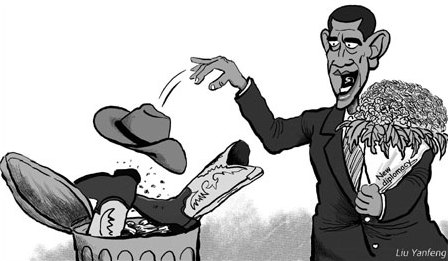
|
OPINION> Commentary
 |
|
Obama's diplomatic 'New Deal' unfolding
By Wang Yusheng (China Daily)
Updated: 2009-02-19 07:46
Less than a month after the inauguration of President Obama, his diplomatic team has started to reach out in all directions. Presidential emissaries George Mitchell and Richard Holbrooke have visited the Middle East and South Asia respectively, and Vice-president Joe Biden attended the Munich Security Conference to give a policy speech on behalf of the administration. Secretary of State Hillary Clinton is already on a visit to four East-Asian countries, and released quite a few speeches before her departure. The diplomatic forays have attracted a great deal of international attention and comments, as well as hopes US diplomacy will take a "correct path". Judging from all the signs, especially Biden's speech in Munich, Obama's preference for diplomacy is becoming clear. The flexibility of his policy space, however, is still quite large, so many uncertainties remain. It can hardly be said his policy orientation is settled, so more observation is needed. The Obama team's first goal in trying to foster a "diplomatic New Deal" is to distance itself from the "cowboy diplomacy" of George W. Bush. The policy speech of Vice-president Biden explicitly declared that "the new administration is determined to set a new tone in the US relations around the world," while US will increase its "contact", "listening" and "discussion" of issues with the outside world. One of its key phrases is multilateral cooperation, an acknowledgment the US cannot address significant global issues on its own. Alas, this is good news for the international dtente.
The second aim is to test the waters. Heeding domestic and international feedback, the administration is identifying which parts of the "Obama diplomatic Perestroika" are practical, which parts are hard to implement, and those that are unfeasible. It is laying the groundwork for the new orientation of Obama diplomacy, and getting ready to bargain with all stakeholders in future. It is apparently pragmatic, and beneficial in preventing excessive swings in foreign policies. The third point is to declare the "continuity and inheritance of America's fundamental strategy". Despite many differences between Obama and Bush in diplomacy, they indeed have the same dream: sustaining the super power status of the United States to lead the world. Their "grand strategy" is basically identical. The difference is just that Obama seeks to "refurbish" the image of America, so he will be cautious in using force and make diplomacy a priority. The policy speech of Biden was obviously not that aggressive, with quite a few signals sounding out cooperation and reconciliation. But there are still a few hints of the US' inherent "bossy mentality", if the speeches addressed by Biden and his team are examined. Besides the emphasis on "mutual needs", the speeches of Biden and others still hold America aloof. They only wish to make contact with, listen to, and discuss with the outside world, not cultivate "equal partnerships". In fact, it indicates that the Obama New Deal is not going to implement true "multilateralism", but a multilateralism under the guidance of the US. On the Iranian nuclear issue, deployment of an anti-missile system in Eastern Europe, and the prospect of Georgia and Ukraine joining NATO, few hints signify a change in tone, let along a change of course. Starting last Saturday, Clinton will successively visit Japan, South Korea, Indonesia and China. It seems her mission is somewhat different from Biden's at the Munich Conference. The mission of Biden was to win over Europe and coordinate the US stance with it, to soothe strained relations with Russia, and to loosen the rigid pose on the Iranian nuclear issue that the US does not directly negotiate with Iran, in order to show the White House is willing to offer carrots to states including Iran.
 The focus of Clinton's visit to four Asian countries is to seek cooperation and support, especially in finance. Japan and China are the United States' largest creditors. The Japanese media has eagerly sensationalized the sequence of countries visited by Clinton, which is in fact not that important. What is key is the focus and content of the meetings, as well as the level and scope of cooperation. Nowadays, the US could not leave Japan, and could not leave China either, and vice versa. Also, strategic mutual beneficial relations exist between China and Japan. For this reason, China, the US and Japan should work hard on promoting trilateral cooperation and seek win-win outcomes. The "2 (the US and Japan) versus 1 (China)" scenario during the Cold War period has become obsolete. Finally, it is worthy of mentioning the visit by Clinton to Indonesia. In his first TV interview, President Obama explicitly declared he seeks to reconcile US relations with the Islamic world, and said that the US is not the foe of the Islamic world. He also admitted that "The US sometimes makes mistakes. "We are not perfect." This is a stark contrast to the behavior and deeds of eight years of the Bush administration. It seems that the visit by Clinton to the most populous Muslim country is closely related to Obama's diplomatic Perestroika. The author is a Beijing-based researcher in international relations. (China Daily 02/19/2009 page9) |